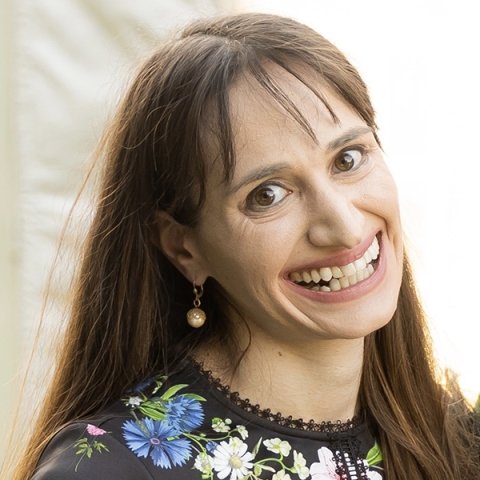Q&A with Emily Yankowitz PhD ’25
Yankowitz received the John Addison Porter Prize for her dissertation on American citizenship before the Fourteenth Amendment.
June 10, 2025

When Emily Yankowitz PhD ’25 (History) first began research for her dissertation in 2018, she could not have imagined it becoming a hot topic on the nightly news. An early Americanist, she was interested in U.S. citizenship before it was defined and stabilized by the Fourteenth Amendment, with the American Revolution as her starting point. By the time she submitted her dissertation, “Who Is a Citizen: Negotiating American Citizenship Before the Fourteenth Amendment,” in March 2025, the topic had taken on a surprisingly contemporary relevance, with birthright citizenship being questioned by a presidential executive order.
Her work was honored at the Graduate School’s Convocation Ceremony with the George Washington Egleston Historical Prize and the Edwin W. Small Prize—both of which recognize outstanding work in the field of American history—and the John Addison Porter Prize, considered to be one of the university’s most prestigious awards.
We sat down with Yankowitz to learn more about her research process, her journey to Yale, and what’s next in her career.
Your research on citizenship is very timely. How did you come to focus on this topic?
Yes, it is an absolutely wild time to be working on citizenship! I came up with the idea for the project around 2018, long before I could have predicted how relevant it would become. Initially, I assumed citizenship had always had a stable meaning and conferred specific rights. But through my research, I realized that wasn’t the case. I began by looking for things we associate with citizenship—like voting or jury duty—and it was not coming up. That helped me develop new questions.
What sparked your interest in this area originally?
In high school, I volunteered at St. Paul’s Church, which is a national historic site in Mount Vernon, New York, where I was doing research on Alexander Hamilton’s defense of Loyalists. That got me interested in Loyalist reintegration after the American Revolution. My MPhil dissertation at Cambridge University, funded by a Paul Mellon fellowship from Yale, explored Loyalist reintegration in Pennsylvania and Massachusetts. I came across individuals asking for political or economic citizenship, which opened my mind to the idea that citizenship could occur in many forms and that motivated me to delve further into the topic.
What kinds of documents did you rely on in your dissertation research?
I looked at passports—which I absolutely love—as well as seamen’s protection certificates, diaries, correspondence, petitions, and state constitutions. Surprisingly, newspapers weren’t very useful. I argue that individuals used documents to claim citizenship, while the federal government used them to claim citizens.
When did the U.S. start issuing passports?
Pretty much from the founding of the country. They were first issued to ships, then to people. But what I found fascinating is it takes until 1856 for the federal government to assume complete control over issuing them. Before that, mayors, notaries, and governors issued them as well, which was not what I expected.
What were some of your key findings?
One major realization was how malleable the term 'citizenship' was. People on the margins could claim it for themselves. I also found that citizenship was negotiated—not just conferred by governments from the top down. Individuals negotiated with local and state officials, and states negotiated with the federal government. It was a dynamic, unstable process.
Did you collaborate with scholars from other disciplines?
My project aimed to fill a gap in historical scholarship. Political scientists and legal scholars have written a lot about citizenship, but historians less so. I tried to approach it from a historical perspective—bottom-up and top-down—rather than just focusing on laws or theories.
Did your research touch on slavery and the citizenship status of formerly enslaved people?
There’s fantastic scholarship in this area, which gave me a firm foundation. I examined how formerly enslaved people were involved in the negotiation process around citizenship. For example, I looked at Black men who applied for federal passports to claim citizenship.
What’s one thing you wish more people knew about your field?
That history is contingent. We often think the past was a straight line of inevitable events, but it wasn’t. People were figuring things out as they went along. That’s something I find reassuring—it’s okay not to know what you’re doing.
Did you have opportunities to share your research with broader audiences?
Yes, I wanted a topic that could be explained to people and contribute to society. I’ve presented at Yale and served on advisory boards for historic sites outside Yale. I also spoke to a 5th-grade class in Detroit, which was a fun challenge.
Who were some of your key mentors?
I’m very grateful to my committee—Joanne Freeman, Mark Peterson, and Ed Rugemer. Joanne Freeman has been a mentor since I was an undergraduate here at Yale. I also worked at the Beinecke Library and The Papers of Benjamin Franklin, where I had great mentorship.
What are your plans after Yale?
I’m starting a job as an Assistant Editor at The Papers of Benjamin Franklin at Yale, which I’m really excited about.
Any final thoughts?
I’m profoundly grateful for the funding and support I received from Yale and from individual archives. A tremendous amount of my work in actual archives would not have been possible without support from Yale and individual archival institutions ranging from Louisiana State University to the Massachusetts Historical Society. I hope I’ve made the most of the opportunities I’ve been given.